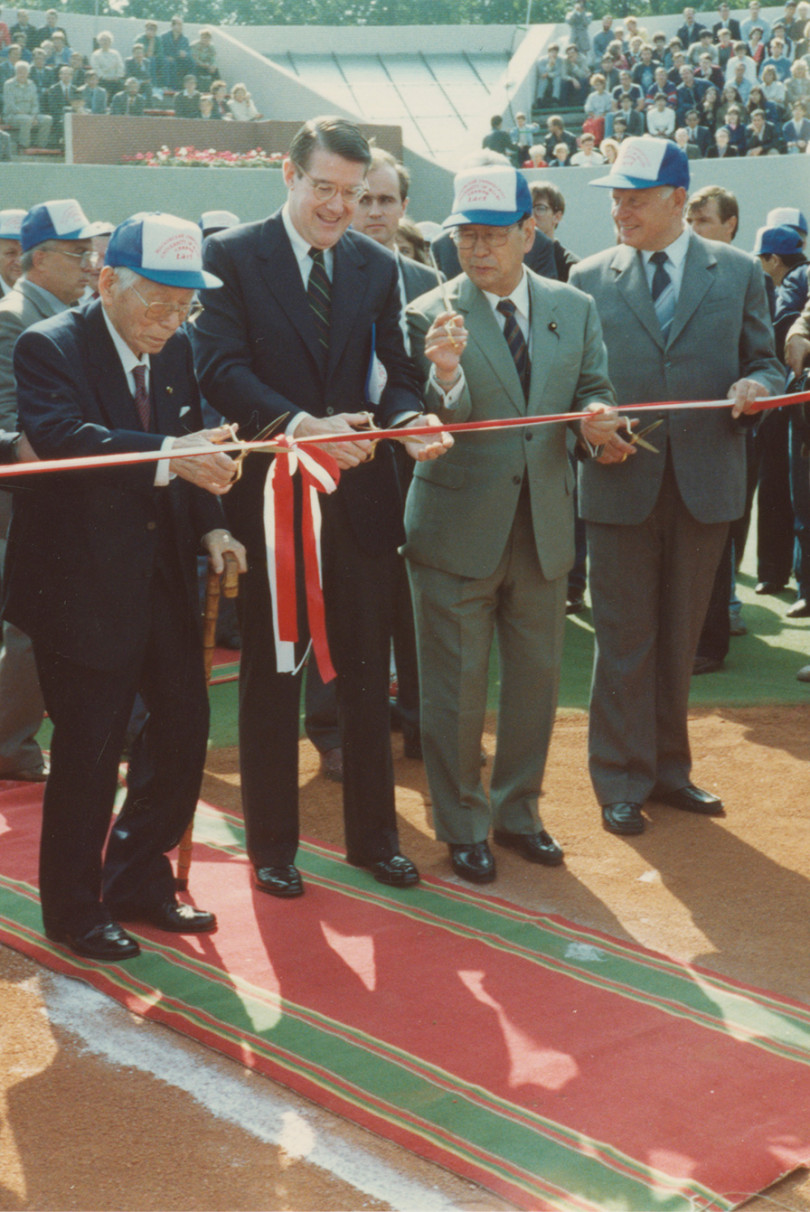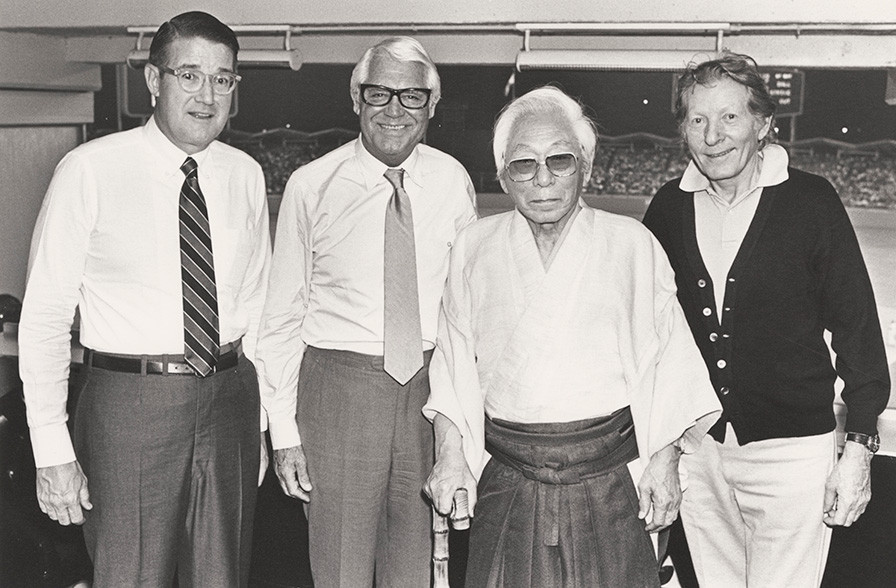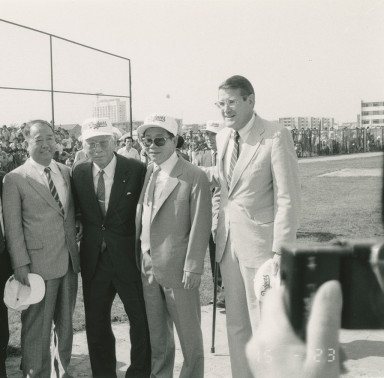
Dr. Shigeyoshi Matsumae (far left) and Dodger President Peter O’Malley (second from left) participate in ribbon cutting ceremonies at Matsumae Baseball Stadium, Moscow State University, Lenin Hill in Moscow, Russia on September 1, 1989. Mr. Zaikov is on far right, while second from right is unknown. Matsumae, who founded Tokai University in Tokyo, Japan, privately built the first field dedicated solely to baseball in Russia with hopes of bringing countries closer together.
Biography
Dr. Shigeyoshi Matsumae
Dr. Shigeyoshi Matsumae of Japan was highly-regarded leader, educator and electrical engineer who invented the non-loaded cable carrier system. He was Founder and President of Tokai University in Tokyo. He was a proponent that countries could be brought together through a common interest in sports to promote world peace. Dr. Matsumae was posthumously inducted into the Japan Baseball Hall of Fame in 2022.
In 1982, Dr. Shigeyoshi Matsumae had the idea that Peter O’Malley should meet in person with the Soviet Union Minister of Sports Sergei Pavlov in order to seek support for baseball to become an official Olympic sport. Dr. Matsumae believed that sports and in particular baseball could be a significant bridge connecting Japan, Russia and the United States. Dr. Matsumae wrote a letter of introduction for O’Malley and Akihiro “Ike” Ikuhara, assistant to O’Malley, to hand carry to Russia. Peter, who had to cancel joining Ikuhara at the last minute, provided the letter of introduction to Ikuhara to hand carry to Pavlov, from Pavlov’s good friend Dr. Matsumae. Ikuhara traveled to Moscow to meet with Pavlov. October 7, 1982 marking the first time baseball in the Western Hemisphere made official contact with the Soviet Union. The meeting, held in Moscow, was also attended by Isao “Dutch” Odachi, baseball coach in Japan and baseball advisor to Dr. Matsumae.

June 14, 1983, Dodger Stadium, (L-R): Dodger President Peter O’Malley; actor Cary Grant; Dr. Shigeyoshi Matsumae, Founder and President, Tokai University, Tokyo, Japan; and entertainer Danny Kaye.

September 12, 1986, Grand Opening ceremonies for Dodger Baseball Field, privately built by O’Malley, at Tianjin Institute of Physical Culture, TIanjin, People’s Republic of China. (L-R): Li Menghua, Minister of Sports, People’s Republic of China; Dr. Shigeyoshi Matsumae, Founder and President, Tokai University, Tokyo; Li Ruihuan, Mayor of Tianjin; and Dodger President Peter O’Malley.
“The message was that we would appreciate it if Russia would not veto baseball and Dr. Matsumae was planning to build a baseball stadium at Moscow State University on Lenin Hill in Moscow,” said O’Malley. “As we were considering our goal, we realized that if baseball became an official Olympic sport significant dollars would be sent to developing countries by the IOC to fund instructors, fields and equipment and that would greatly enhance the growth of baseball.”
Dr. Matsumae’s letter was a success. Ikuhara and Odachi immediately traveled from Moscow to IOC headquarters in Lausanne, Switzerland to meet Dr. Arpad Csanadi (from Hungary), chairman of the IOC Programing Committee, to convey the message about their meeting with Pavlov, who was also president of the USSR National Olympic Committee, and that he would not oppose the movement for baseball to become an official gold medal sport. Shortly thereafter, on October 12-13, 1982, O’Malley flew to Tokyo to meet with Dr. Matsumae to express his appreciation for the letter that opened the door to Pavlov and his cooperation.
On June 14, 1983, Dr. Matsumae traveled to Los Angeles to participate in meetings and attend a Dodger game with Peter O’Malley, Akihiro “Ike” Ikuhara and Rod Dedeaux. The next summer, during the eight-team exhibition tournament of baseball during the Games of the XXIII Olympiad in Los Angeles, Dr. Matsumae returned to Dodger Stadium and enjoyed several games alongside Peter and other baseball leaders. Peter and Ike also visited Dr. Matsumae at Tokai University to discuss building of baseball fields to develop the sport. Dr. Matsumae privately financed and built the first field dedicated to baseball in Russia. Through his friendship with Dr. Matsumae, Peter was inspired to privately build a baseball field in Tianjin, the People’s Republic of China, which opened September 12, 1986. Dr. Matsumae attended the opening of the field, while Peter and Ike went to groundbreaking ceremonies in Russia in April, 1988. They returned to Russia for the September 1, 1989 inauguration ceremonies for Matsumae Stadium at Moscow State University and Dr. Matsumae asked Peter to participate in the ribbon cutting.
In 1944, because of his strong anti-war activities, Dr. Matsumae was removed from his post as Director General of the Technical Bureau, Ministry of Communications, as punishment by Japan Prime Minister Tojo, and forcibly conscripted as a private soldier (second class) and sent to the front lines in the Philippines. But, Dr. Matsumae survived his military exile at age 42 to the Philippines, Vietnam and Singapore. Just two days after the atomic bomb was unleashed on Hiroshima, the Japanese government made Dr. Matsumae leader of the Hiroshima Bomb Investigation Group and sent him to Hiroshima. He witnessed first-hand the horrific loss of life and returned to Tokyo with his investigative report to the Emperor. Dr. Matsumae was chairman of the International Judo Federation and founder of the Matsumae Cup, a European judo tournament. In 1979, he established the Matsumae International Foundation which aims to bring people together through global friendships and goodwill. Dr. Matsumae wrote several books, including “My Turbulent Life in a Turbulent Century” in 1982. He passed at 89 years old August 25, 1991.

